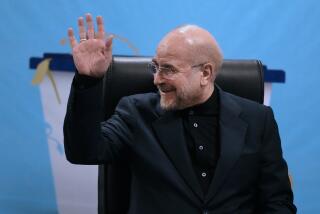Afghan officials set August date for presidential election
- Share via
KABUL, AFGHANISTAN, AND ISTANBUL, TURKEY — Afghan officials on Thursday set Aug. 20 as the date for their nation’s presidential election, starting the clock on a campaign that will be waged against the backdrop of an increasingly violent insurgency and rising domestic discontent.
President Hamid Karzai, installed in 2001 by the United States after the fundamentalist Taliban movement was toppled, and subsequently elected in 2004, is widely viewed as the front-runner, though he has not yet declared his candidacy. But the Afghan leader’s popularity has plummeted in the last year, and his relationship with his onetime Western patrons has grown increasingly tense. Moreover, the full field of candidates is not yet known.
Karzai has an edge over those Afghan politicians who have declared their interest in running, but it is not known how he might fare if a well-known figure such as Zalmay Khalilzad -- the Afghan-born former U.S. ambassador to Afghanistan, Iraq and the United Nations -- were to enter the race.
The Afghan Constitution mandates that the election be held before Karzai’s term expires May 22. But few had expected polling to take place on schedule because of the perilous security situation.
Voter registration is underway across the country, but has been hampered in areas where the Taliban movement is particularly strong, such as the southern provinces.
The Karzai camp had reportedly hoped for polling to take place in the autumn to give the president more time to woo voters, so an August date is not too far removed from its wished-for timetable.
Azizullah Lodin, who chairs the Independent Election Commission, told reporters in Kabul, the capital, that it was impossible to hold balloting before the end of Karzai’s term. To avoid a power vacuum, lawmakers are expected to approve a temporary extension of his authority or appoint a caretaker government. Although some of his opponents complained about the delay, international bodies including the United Nations supported the timetable.
Up to 30,000 more U.S. troops are to arrive in coming months, with many of them to be deployed in the south and similar trouble spots. Lodin described that influx as a factor in deciding the timing of the balloting.
“Without security, there can be no election,” he said.
The campaign comes amid a wide-ranging reappraisal of Afghan policy by the Obama administration, which has already put Karzai on notice that tougher demands will be placed on him than was the case under former President Bush. The Afghan leader reportedly had a stormy encounter this month with Vice President Joe Biden, who paid a pre-inaugural visit to Afghanistan.
Officials familiar with the discussions said Biden bluntly informed the Afghan leader that corruption, a key source of public discontent, had gotten far out of hand. Biden reportedly warned that without significant improvements, Karzai could not count on the backing of the new U.S. administration.
Much of Afghanistan’s pervasive corruption is fueled by the drug trade. U.S. officials have said they suspect Karzai’s brother, Ahmed Wali Karzai, is involved in narcotics trafficking.
The Afghan president, for his part, has accused the international community of failing to deliver on promises of better security, making it difficult for his administration to establish its writ across Afghanistan. Critics sometimes call Karzai “the mayor of Kabul,” a derisive reference to the lack of meaningful governance in much of the country.
In recent months, Karzai has expressed increasingly open anger over civilian casualties that sometimes occur during coalition military operations. U.S. troops have been involved in the majority of such incidents.
Hours before President Obama was sworn in, Karzai told Afghan lawmakers that the rate of civilian casualties was “unacceptable,” complaints he has since renewed as more reports have emerged in recent days of civilians having been killed or injured.
Obama and Karzai have met, but their relationship appears far less cordial than the one the Afghan leader enjoyed with Bush. During a July visit to Kabul, Obama ruffled feathers by saying that Karzai had not “gotten out of the bunker” to create an effective judiciary and police force. Karzai’s aides privately were miffed, noting that the Afghan leader had survived a number of assassination attempts.
In Brussels, the North Atlantic Treaty Organization, which has more than 60,000 troops in Afghanistan, welcomed the setting of an election date, news agencies reported.
“We are pleased that the decision has now been taken,” alliance spokesman James Appathurai told reporters. “The date chosen will give us as NATO sufficient time to properly prepare to support the Afghan government in ensuring enough security for the elections to go forward.”
Karzai’s relations with NATO have been strained as well in recent months. He is seeking a greater say in when and how Western troops are deployed, a demand to which the alliance has not yet responded.
This month, NATO Secretary-General Jaap de Hoop Scheffer suggested that Karzai’s leadership had been ineffective.
--
--
Faiez is a special correspondent.
More to Read
Sign up for Essential California
The most important California stories and recommendations in your inbox every morning.
You may occasionally receive promotional content from the Los Angeles Times.










